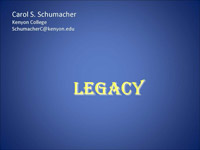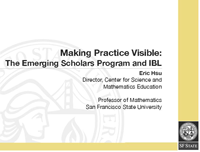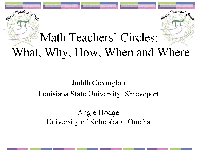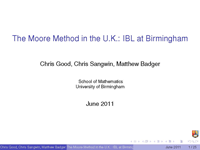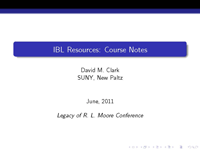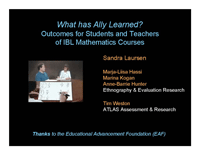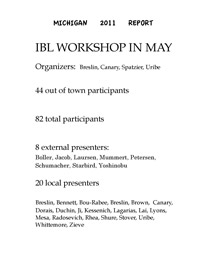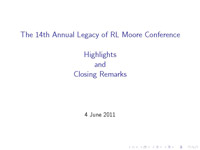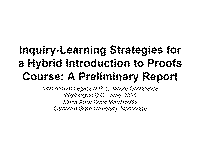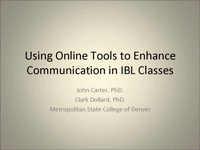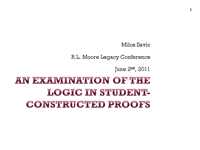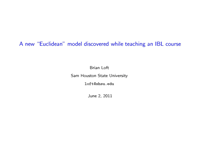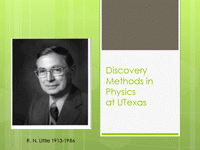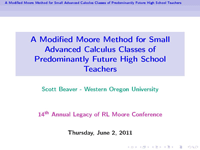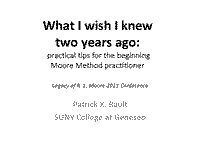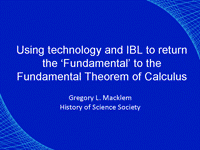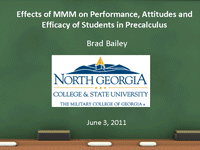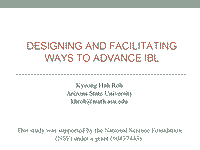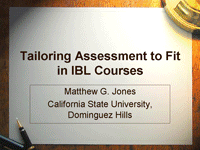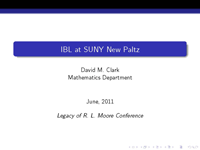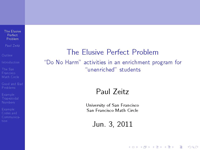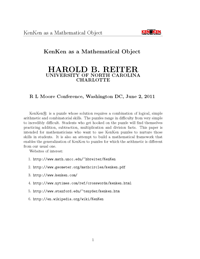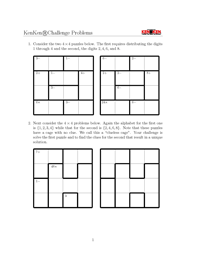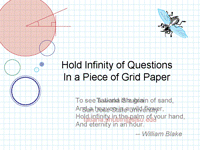14th Annual Legacy of R.L. Moore Conference,
Washington DC, 2–4 June 2011
Program
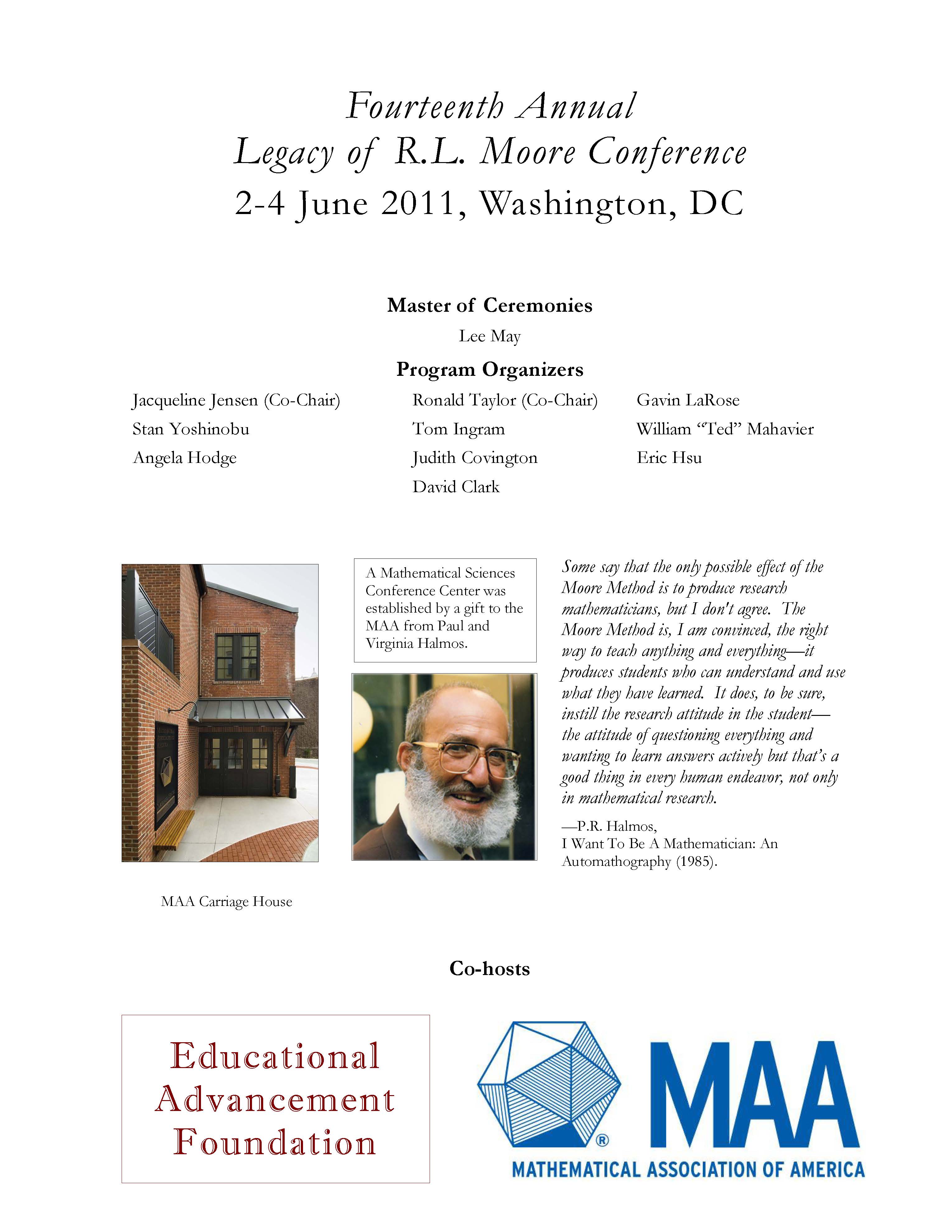 |
|
Thursday, June 2nd
10:00-1pm
Registration Begins
11:45 – 12:45pm Welcome Lunch
12:00 – 12:20pm
David Bressoud and Paul Zorn
EAF and MAA in Partnership
A few remarks by the past and current presidents of the Mathematical Association of America on the importance of the relationship between MAA and EAF.
1:00 – 1:15pm
Welcome & Overview
Jacqueline Jensen and Ron Taylor
Co-Host: Michael Pearson, MAA
MC: E. Lee May
1:15 – 1:45
William “Ted” Mahavier, Lamar University
The Moore Method: Transformative Experiences
All teaching methods, whether lecture, problem-based, inquiry-based or Moore Method, convey mathematical material to our students. The difference between any two mathematics courses on the same topic is not in the mathematics that we transfer to the student, but in what other opportunities exist for the students. Not only does the Moore Method offer the opportunity for increased confidence and improved communication skills, it also offers the opportunity for a transformative experience – an experience that somehow changes the student in some substantial, but not easily measured way.
1:50 – 2:30
Stan Yoshinobu, Cal Poly San Luis Obispo
Saving Ally
Mathematics Education research results suggest that traditional instructional practices are not meeting the needs of many students. One question that arises is: "What does this really mean?" In this talk the real costs of not meeting students' needs will be discussed, along with the challenges we face as teachers of mathematics.
2:35 – 3:10
Nathaniel Miller, University of Northern Colorado
Multiply-Modified Moore/Miller Methods: The Many Faces of Inquiry-Based Learning in my Classes
I use inquiry-based learning in virtually all of my classes, but this learning takes many different forms. In this talk, I will discuss some of the successes and failures that I have had over the years as my teaching styles have evolved to better meet the needs of different classes and groups of students.
3:10 – 3:40 Break for Refreshments
3:40 – 4:30
New Users Panel
Moderator: Ron Taylor, Berry CollegeLeah Childers, Pittsburg State University
Michael Lomuscio, Rabun Gap – Nacoochee School
Elena Marchisotto, California State University Northridge
Robert Vallin, Slippery Rock University
4:35 – 5:30 Breakout Sessions – See schedule below. Topics:
Virginia A – Technology and IBL
Virginia B – General Contributed Paper Session
Virginia C – General Contributed Paper Session
Nathan Hale – General Contributed Paper Session
5:30 – 7 pm Free Time
7-9pm Dinner –
Mike Starbird
Transforming Lives: Teaching Thinking and Creativity
Beyond teaching mathematical skills, IBL experiences frequently involve interesting consequences on students’ attitudes concerning self-reliance, independent thinking, persistence, and willingness to make mistakes. IBL courses can transform lives.
Friday, June 3rd
7:30-8:30 Continental Breakfast
8:30 – 9:00
Carol Schumacher, Kenyon College
Legacy
Who was R. L. Moore and what did he do that, so long after his death, we come together to celebrate his life and work? What is the legacy of by R.L. Moore? And what special responsibility do we incur from that legacy?
9:05 – 9:35
Judy Holdener, Kenyon College
To understand is to invent: empowering students with technology
As teachers of mathematics, we strive to get our students to move beyond the surface knowledge of our discipline and to delve deeply into the creative process of mathematics. Our students are not vessels to be filled with facts, but rather active problem-solvers who learn by exploring, manipulating, experimenting, questioning, and searching out answers for themselves. Activity is essential. In this talk I will present concrete ways in which I have used technology as a vehicle for such activity. In doing so, I will reveal my own views relating to the creative process of mathematics – views that place a large weight on the importance of mental imagery, playful experimentation, and lateral thinking in mathematics.
9:35 – 9:50 Five Minute Talks, Session I
9:55 – 10:15 Break
10:15 – 10:45 Five Minute Talks, Session II
10:50 – 11:20
Eric Hsu, San Francisco State University
Making Practice Visible: The Emerging Scholars Program and IBL.
The Emerging Scholars Program is an intensive non-remedial mathematics program which focuses particular attention on increasing success of underrepresented minorities. This model was created 35 years ago, and has been adopted by over a hundred colleges around the U.S. At the heart of the model is a multicultural workshop where students solve problems in groups and individually. We discuss how the role of IBL evolved in a natural way in response to ethnographic research into differences in student academic culture as well as the practical needs of the program.
11:25 – 11:55
Jacqueline Jensen, Slippery Rock Univ. and Ron Taylor, Berry College
Assessment in an IBL Classroom
How one person's abilities compare in quantity with those of another is none of the teacher's business. It is irrelevant to his work. What is required is that every individual shall have opportunities to employ his own powers in activities that have meaning. Mind, individual method, originality (these are convertible terms) signify the quality of purposive or directed action. - John Dewey from Democracy and Education
In the context of Dewey's quote, it seems that the use of inquiry can facilitate giving each student the opportunity to “employ his own powers in activities that have meaning" toward the goal of learning. In this presentation we propose some answers to the following questions:
1. Does assessment in an IBL classroom differ from assessment in a lecture style classroom? -
2. If there is a difference, does it necessarily imply the need for different types of assessment techniques? -or-
3. Can traditional assessment techniques be used as-is in an IBL classroom? -or-
4. Can traditional assessment techniques be modified to better serve students in an IBL classroom?
5. What new assessment techniques can be devised to serve students in an IBL classroom so that their learning in the context of their own meaningful activities is revealed?
12:00 – 1:00 Lunch
1:00 – 1:45
Angie Hodge, NDSU and Judith Covington, LSU - Shreveport
Math Teachers' Circles: Why, What, When and Where?
Math Teachers’ Circles are a form of professional development that uses inquiry-based learning techniques to help practicing teachers improve their mathematical knowledge through content rich problem solving. Collaborations are made between university faculty, middle school teachers, and K-12 administrators to create a learning community. These sessions are held to give the middle school teachers a chance to learn mathematics and solve problems for their own enjoyment. Emerging research on Math Teachers’ Circles indicates that they are successful in increasing teachers’ mathematical knowledge for teaching, and that participating teachers report increases in their confidence, interest in mathematics, and use of problem solving in their classrooms. In this session, we will briefly discuss how we began our Math Teacher’s Circles. We will focus on the connection between inquiry-based learning and Math Teachers’ Circles. Specific examples will be provided, including an interactive problem solving session, to help attendees get a feel for the power of this inquiry-based professional development experience.
1:55 – 3:10 Breakout Session II - See schedule below. Topics:
Maryland Suites – General Contributed Paper Session
Virginia A – Assessment and IBL
Virginia B – Technology and IBL
Virginia C – Math Circles and IBL
Nathan Hale – Emerging Scholars Programs and IBL
3:10 – 3:30 Break
3:30 – 4:00
Chris Good, Chris Sangwin and Matthew Badger, University of Birmingham
The Moore Method in the UK: IBL at Birmingham
In 2004, with generous support from the EAF, Dr Chris Good set up a Moore Method course for the first time at the University of Birmingham in the United Kingdom (UK). The course is an optional module, of 27 contact hours over one semester for mathematics major students in their first year of university. Since 2004 it has been taught by three different members of staff with a variety of problem sets. In this talk we will set the scene for university teaching in the United Kingdom, and specifically at the university of Birmingham. We will describe our goals for the course, and our experiences of teaching this module. Matthew Badger has undertaken an evaluation of the outcomes of this course, including a quantitative analysis of students' progress and a qualitative study of their attitudes and experiences of the course. We will report our results. Lastly we will comment on the use of Moore Method courses, and problem solving in university mathematics, at other United Kingdom Universities.
4:05 – 4:30 Five Minute Talks, Session III
4:30 – 5:00 Panel Discussion –
What Resources are Available to Me?
AIBL and Visiting Speakers’ Bureau – Stan Yoshinobu and Mark Stankus
JIBLM and the Geometry Project – David Clark
5:00-6:30 Reception, Carriage House, MAA Headquarters
Saturday, June 4th
7:30 – 8:30 Buffet Breakfast
8:30 – 9:30
Sandra Laursen (Joint work with Marja-Liisa Hassi, Marina Kogan, and Anne-Barrie Hunter, Ethnography & Evaluation Research, and Tim Weston, ATLAS Assessment and Research Center, University of Colorado Boulder)
What has Ally Learned? Outcomes for Students and Teachers of IBL Mathematics Courses
We have recently completed data analysis for a large, multi-method study of inquiry-based learning in college mathematics as implemented across four university IBL Mathematics Centers. From classroom observations and interviews, we identify key features of these courses that were generally shared despite variations in style and implementation. We share some of the rich evidence from student surveys, tests, interviews, and academic records about how students benefited from IBL experiences and who appeared to benefit in particular. Finally, we highlight the learning processes that were important in these IBL classrooms, particularly the “twin pillars” of deep engagement in mathematics and collaboration with others.
9:30 – 9:45 Break
9:45 – 10:45 Five-Minute Talks, Session IV
10:45 – Ron Douglas, Texas A&M University
IBL Centers Update
11:00 – 11:45 Ron Douglas and the IBL Centers
11:45 – 12:00 Concluding Remarks,
Jacqueline Jensen and Ron Taylor
Breakout Session I – Thursday 4:35 – 5:30 pm
Maryland Suites (General Contributed Paper Session):
4:35 – 4:50 Rebecca Mercuri, The College of New Jersey and Notable Software, Inc.
Forensics as an Inquiry-Based Learning Method
Although the focus of forensic investigations involves preparation and examination of materials that will be presented in a courtroom setting, such methodologies can also be applied to the understanding of mathematical concepts. As with theorem proving, forensics involves the application of inductive reasoning to determine "what is or was" as well as deductive thinking in order to intuit "what is not or was not," often with disparities in symmetry between the inductive and deductive aspects adding complexity to the case. This talk will demonstrate how forensic techniques can be used to facilitate IBL in encouraging student interaction in problem solving.
4:55 – 5:10 Elizabeth Thoren and Brian Katz, UCSB
Wiki Technology Supports Inquiry
Inquiry-based learning creates new challenges for students and faculty. For example, some students struggle with the lack of a textbook resource and others are anxious about the heavy emphasis on public speaking. We believe that student-generated wikis offer support for these challenges and additional benefits by mirroring the IBL classroom experience in writing. We will share some of our experiences using wikis in a wide variety of courses from an Honors Calculus III class at a large university to Calculus I and Modern Geometry at a small college.
Virginia A (Technology and IBL):
4:35 – 4:50 *Elena Marchisotto, California State University - Northridge
Inquiry-Learning Strategies for a Hybrid Introduction to Proofs Course: A Preliminary Report
In this talk, I will report on an Introduction to Proofs course conducted at California State University, Northridge, which incorporated a modified Moore method in its delivery. This course was taught for the first time in hybrid format (part classroom instruction/part on-line instruction) in Spring, 2011, using course materials adapted from those prepared by Professor Ron Taylor of Berry College. I will describe the course components, and share the various assessment tools that were used to evaluate their effectiveness.
4:55 – 5:10 *Jorgen Berglund, California State University – Chico
Graphing calculators and data collection devices as vehicle for mathematical thinking
Appropriately used, technology provides us with the means to both challenge our students and deepen their mathematical understanding. Consider, for instance, the topic of functions. When studying functions ($R\to R$), students are presented with multiple representations of functions, but their understanding of these representations, and the connections between them, is often limited. A student may know how to graph a function, finding its local maximums, local minimums, and inflection points, but often they have limited ability to interpret the graph. Or a student may be able to generate a table and graph the points from a table, but they will have little understanding for how tables can be used to illustrate differences in the functions or be used solve equations. We will consider examples of the use of handheld technology that allow students to make connections and develop understanding of various representations of functions.
5:15 – 5:30 John Carter and Clark Dollard, Metropolitan State College of Denver
Using Online Tools to Enhance Communication in IBL Classes
The presenters will discuss how they use online tools to enhance communication in their IBL classes. These tools allow students to communicate before class which proofs they are ready to present, where they are stuck, and what questions they have, which allows the instructor to more effectively facilitate class presentations and discussions. Furthermore, after proofs are presented, students can post their finished proofs online. If desired, these tools can also provide an online question forum where students can post and answer each other’s questions. Audience members will be encouraged to share their own experiences using online tools in IBL classes.
Virginia B (General Contributed Paper Session):
4:35 – 4:50 Milos Savic, New Mexico State University
An Examination of the Logic in Student-Constructed Proofs
Often university mathematics departments teach some formal logic early in a transition-to-proof course. This study of forty-two student-constructed proofs of theorems about sets, functions, real analysis, abstract algebra, and topology, found that only a very small part of those proofs involved logic beyond common sense reasoning. Where is the logic? How much of it is just common sense? Can the needed logic be taught in context while teaching proof-construction? Through a theoretical framework emerging from a chunk-by-chunk analysis of student-constructed proofs and from task-based interviews with students, I try to shed light on these questions.
4:55 – 5:10 Taoufik Nadji, Northwestern Michigan College
Moore Method and Arts Students
The presenter, who is both an instructor at a community college and at a prominent arts high school in Michigan, will share how he instituted Moorish Activities in his curriculum at Interlochen Arts Academy for the first time ever during second semester of this academic year. In addition, the presenter will share examples from his newly developed Moorish notes and what kind of impact these notes along with the Moorish Activities had on his students' renewed attitude toward math and on their improved performances in tests and quizzes.
5:15 – 5:30 Carl R. Seaquist, Nicole Tunmir, and James Valles, Texas Tech University
Inquiry-based Learning and Distance Education
Last academic year, the authors taught a two-semester asynchronous online course on the topology of the real line based on a sequence of definitions, problems, and theorems created by J. R. Boyd and G. R. Gordh. First, the presentation will outline the use of technology to present material, collect student input, manage class interactions, and assess individual progress. Next we will focus on the various challenges encountered and how they were addressed. Finally, learning from this experience we propose a set of guidelines for future online courses using inquiry based learning.
Virginia C (General Contributed Paper Session):
4:35 – 4:50 Brian Loft, Sam Houston State University
A new Euclidean model discovered while teaching an IBL course.
While teaching a course on Euclidean geometry using a version of David Clark's course notes, some new geometric models were discovered that prove to be very valuable in the classroom. The model will be defined, and tips for using it in an IBL classroom will be given.
4:55 – 5:10 Austin Gleeson, University of Texas at Austin
Discovery Methods in Physics at Texas
It is well known in the mathematics community that R.L. Moore was the developer of an instructional method based on what are now called discovery methods. A later but also significant was the first example of a similar teaching method developed for the physical sciences by a University of Texas physics colleague, Professor R. N. Little. In recent years, there has been a great deal of interest in using these methods for teaching science generally and physics in particular. In this talk I will review some of the history of teaching discovery physics at Texas but most of the emphasis will be on the course sequence that was developed by Bob Little and which is still taught at the University of Texas.
5:15 – 5:30 Scott Beaver,
A Modified Moore Method for Small Advanced Calculus Classes of Predominantly Future High School Teachers
Inquiry-Based Learning is a proven technique for providing future mathematicians with confidence and independence, but the method naturally has wider application. In particular, even in quite small upper-division courses, and even when all or almost all of the students have chosen a high school teaching career, we can apply a tailored form of the Moore Method. I'll offer a precise description of the framework for Advanced Calculus courses I've taught under these circumstances, with a detailed discussion of assessment and thoughts on when to, and when not to, offer help in the form of leading questions.
Nathan Hale (General Contributed Paper Session):
4:35 – 4:50 Padraig McLoughlin , Kutztown University of Pennsylvania
Come Up With An Idea and `MILK’ It
In order to establish IBL (Inquiry-Based Learning) at our University we have created a theme, MILK (Mathematics Inquiry Learning at Kutztown) Center and how we are attempting to encourage colleagues to adopt the principles and methods of the
Moore Method and IBL at Kutztown and in the region.
We will discuss our success and failures in overcoming obstacles to inquiry-based learning by creating the MILK Center and programs which are centered on IBL which include: undergraduate student research; encouraging students to do Research Experiences for Undergraduates (REUs); having speakers come to Kutztown to talk about IBL; and, propose a BS-MS program which is centered on IBL (including from Senior Seminar for the BS through the thesis for the MS).
We will also discuss some ideas to ’sell’ IBL to a skeptical university community of students, faculty, and administrators (some of which are rather amusing).
4:55 – 5:10 Patrick Rault, SUNY – Geneseo
What I wish I knew 2 years ago: practical tips for the beginning Moore Method practitioner
I began employing Inquiry-Based Learning 2 years ago because lecture was not working. As a novice I received advice from colleagues, students, and experienced Moore Method practitioners. Some advice was impractical for new professors, while other advice was crucial. I will relate the most relevant tips I gained from experiences with two mentors, an MAA Prep workshop, writings by experienced practitioners, course observations, visits to Berry College and Lamar University, and other natural sources of inspiration. I will speak about my successes, failures, and work to overcome failures in my most recent course supported by an AIBL small grant.
5:15 – 5:30 Ali Shaqlaih , University of North Texas at Dallas
Inquiry Based Learning Integrated with Technology
Abstract : This presentation will focus on how technology can be used to facilitate inquiry based learning in teaching mathematics. I will present some results from a research study on pre-service teachers beliefs about inquiry based learning integrated with technology. The presentation will include some sample activities that show how to use inquiry based learning integrated with Mathematica, sketchpad and other programs to teach different topics in mathematics. Examples from different levels and different areas of mathematics will be presented.
Breakout Session II – Friday 1:55 – 3:10 pm
Maryland Suites (General Contributed Papers):
1:55 – 2:10 *Greg Macklem, History of Science Society
Using technology and IBL to put the ‘Fundamental’ back in
the Fundamental Theorem of Calculus
The standard approach to single-variable calculus has reduced the impact of the Fundamental Theorem of Calculus (FTC), to the point where many students take the FTC as given or obvious without realizing its import. Part of this can be attributed to the sequencing of materials and early introduction of notation that serve to short-circuit the learning process. Rarely can this underappreciation be attributed to a genuinely deep intuition about the FTC.
In combination with a resequencing of topics, the technology that is available on graphing calculators or spreadsheets can be utilized to explore areas under curves from a numerical perspective. Students examine various definite integrals, usually with some degree of direction from the instructor, until they make the connection between the areas and antiderivatives. This realization more clearly links derivative and integral calculus, leading to a much greater appreciation for the FTC and why it is, in fact, fundamental. This approach doesn’t inhibit more theoretical approaches, nor does it need to diminish intuitive understandings that many students may hold unawares, but it does make the Fundamental Theorem of Calculus a more important and powerful result.
2:15 – 2:30 Brad Bailey, North Georgia College & State University
The Effects of Modified Moore Method on Performance, Attitudes and Efficacy of Students in Precalculus
This talk will include a description of an EAF supported quasi-experimental study of the effects of a Modified Moore Method (MMM) on students in Precalculus. There were three instructors involved in this study, each teaching both a control (traditional lecture) and treatment (MMM) section, for a total of six sections of Precalculus. We examined the students’ self-efficacy and task-specific efficacy as well as their attitudes and beliefs about mathematics using a survey, which was given twice in each section of the study. We studied the impact of the method on performance by administering a uniform final exam in all six sections. Most of this presentation will consist of summarizing the statistically significant differences between the treatment and control sections. For instance, looking at overall control versus treatment, there was a gain in the MMM sections and, although there was no statistically significant difference in performance among males in this study, there was a significant gain in final exam score for females in the MMM sections. There were also some interesting differences between the self-efficacies and task-specific efficacies of the treatment and control sections, which varied slightly by instructor.
2:35 – 2:50 Bob Milnikel, Kenyon College
Logic and Incompleteness in an IBL setting
A focus of many courses in Mathematical Logic is the Completeness Theorem, an interesting and worthwhile result which brings together many ideas and definitions. However, many of the techniques used in the proof are used once, to prove a single lemma, and then it is on to new ideas and definitions, making it less well suited to an IBL approach than many topics. I propose instead a course based on G"odel's Incompleteness Theorems, which call on fewer definitions, have many opportunities for stair-stepped problems, and more opportunities to refine proof techniques. No prior knowledge of logic assumed.
2:55 – 3:10 Kyeong Hah Roh, Arizona State University
Designing and facilitating ways to advance IBL in a real analysis classroom
Inquiry-based learning (IBL) is regarded as an effective way to foster reasoning and critical thinking. In this presentation I will discuss design and implementation of tasks for inquiry-based learning in an introductory real analysis course. Instruction in the course was mainly given by an inquiry approach, in which students were asked to make and justify conjectures and to evaluate arguments. The inquiry-based tasks started with individual exploration, later small-group discussion (and sometimes exchanging group members), and finally whole-class discussion. I will address issues in designing tasks and instructional interventions, and report how a teacher managed classroom norms for fruitful inquiry.
Virginia A (Assessment and IBL):
1:55 – 2:10 *Ed Parker
Grading an IBL Course: Or Instead of And and Using
Rubrics as Blunt Instruments
Because of the dynamics of IBL pedagogy, a teacher using IBL has available classroom observations typically not available to a lecturer or even a “follow my prompts” interactive classroom conductor. In this talk, a case is made for using these observations as a part of the assessment process as both grade producers and to suggest what questions should be asked if tests are to be used. Changing the emphasis from “the student, after being taught, can do this and this and …” as suggested by averaging grades or giving weights to various aspects of highlighted assignments and adding to assessing “the student did this, or the student did this, or …” is advocated. Connecting a grade to these or’s with a blunt rubric is discussed in the context of different course expectations. Illustrations are made in Moore-method classes, an IBL Mathematics for Elementary School Teachers class, and an IBL/Moore-method class in Math-for-Students-Who-Don’t-Want-to-Take-Math.
2:15 – 2:30 *Matt Jones
Tailoring Assessment to Fit in IBL Courses
In this talk, I will describe my approach to student assessment in a variety of inquiry-based learning courses, including mathematics for elementary teachers, problem-solving for teachers, transition to proof, and more advanced courses such as abstract algebra. This approach includes the rubric used for grading presentations, the relative value given to presentations and other more standard assignments and how this differs by the level of the course, and exam construction.
2:35 – 2:50 *David Clark, SUNY New Paltz
IBL at SUNY New Paltz
I will briefly trace the development of my teaching and grading techniques over many years, and then describe a system that works very well for the students I have and the circumstances under which I teach.
2:55 – 3:10 Panel Discussion: Ed Parker, Matt Jones, David Clark, Ron Taylor
Virginia B (Technology and IBL):
1:55 – 2:25 *Tom Banchoff, Brown University
Course-management software that may facilitate inquiry-based learning
For the past fifteen years at Brown University, in calculus and geometry courses I have been using student-developed software that combines in interactive style of class presentations and online student responses that are ultimately shared with everyone in the class. I will discuss some of the features of this approach that have connections with the aims and concerns of inquiry-based learning.
2:35 – 2:50 *Erica Johnson, St. John Fischer College
The Joy of Numbers, Inquiry, and Wikis
Course management systems like Blackboard support several electronic platforms that can be used to post class notes and facilitate a student-driven editing process as well as an electronic conversation. In particular, the Blog, Wiki, and Discussion Board features of Blackboard can all be harnessed to promote mathematical communication. This presentation will describe the creation and implementation of an inquiry-based number theory course for future high school mathematics teachers in which the class used Blackboard features to complement and supplement course dialogue. In particular, student used the Wiki feature in Blackboard to create a set of class notes and produce solutions to selected homework exercises, thereby placing the onus of organizing and presenting the material on the students themselves. By involving the students in the revision process, they had to carefully read, reflect upon, and interact with the material. Furthermore, using this electronic medium allowed students to continue the conversation outside of the confines of class time and to work together to create a truly collaborative set of course notes and record of class events. A discussion of the results will be included.
2:55 – 3:10 *Matt Leingang, New York University
Social Media in Inquiry-Based Learning
Social media is collaborative. Social media is creative. Social media is hip. Is Social media inquiry-based? We will define social media and give examples of its use in the classroom. We will then discuss ways in which social media can engage students and encourage them into mathematical inquiry.
Virginia C (Math Circles and IBL):
1:55 – 2:10 *Diana White, University of Colorado Denver
Math Teachers' Circles, Inquiry Based Learning, and Mathematical Knowledge for Teaching
Math Teachers' Circles (MTCs) focus on developing teachers'
problem solving skills, often in an open-ended fashion, bearing a strong resemblance to inquiry based learning in this regard. In fact, one could argue that MTCs are a form of inquiry based learning for in-service math teachers. It is well-established that there is a specific mathematical skill set that teachers' need to teach mathematics that differs from the mathematical knowledge needed by those in other professions that use mathematics. The development of this Mathematical Knowledge for Teaching is an ongoing focus of mathematics education research. In this talk, we discuss some preliminary results of a study on the impact of Math Teachers' Circles summer immersion workshops on participants Mathematical Knowledge for Teaching.
2:15 – 2:30 *Paul Zeitz, , University of San Francisco
IBL that works, and IBL that fails in a math circle for "unenriched" students.
A few brief examples of success and failure in the San Francisco Math Circle, a problem-oriented enrichment program serving underrepresented populations since 2005. For our students who like math but have never experienced enrichment programs before, it is essential that one does no harm. Hence, the selection of "the right problem" is not just an academic exercise, but is a crucial, make-or-break decision.
2:35 – 2:50 *Harold Reiter, University of North Carolina Charlotte
KenKen as Mathematical Object
KenKen is a puzzle whose solution requires a combination of logic, simple arithmetic and combinatorial skills. The puzzles range in difficulty from very simple to incredibly difficult. This paper is intended for mathematicians who want to use KenKen puzzles to nurture those skills in students. It is also an attempt to build a mathematical framework that enables the generalization of KenKen to puzzles for which the arithmetic is different from our usual one.
2:55 – 3:10 *Tatiana Shubin, San Jose State University
Hold an infinity of questions in a piece of grid paper
The Math Teachers’ Circle (MTC) Network developed by the American Institute of Mathematics has successfully fostered a culture of creative problem solving among middle school teachers throughout the US. MTC sessions provide teachers with opportunities to discover mathematical facts and theories, to ask and answer their own – sometimes deep and always exciting – questions. In this talk, we will provide examples of some such questions with unexpected ramifications that spring up from observing grid paper.
* Indicates an invited speaker
Program Committee
Ron Taylor, Jacqueline Jensen, Gavin LaRose, Stan Yoshinobu, Tom Ingram, David Clark, Ted Mahavier, Angie Hodge, Judith Covington.
Return to Past Events page.
![]()
[home] -- [mission |
r.l. moore and the moore method |
projects and announcements |
forthcoming events |
past activity reports]
[pictures | people and contacts |
employment opportunities |
literature |
related links]
The R.L. Moore Legacy Project
Comments to the Legacy Webmaster
Last Revised 25 Oct. 2011
![[to the Legacy of R. L. Moore Home Page]](../images/rlmlittle.jpg)

